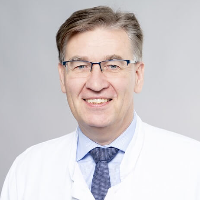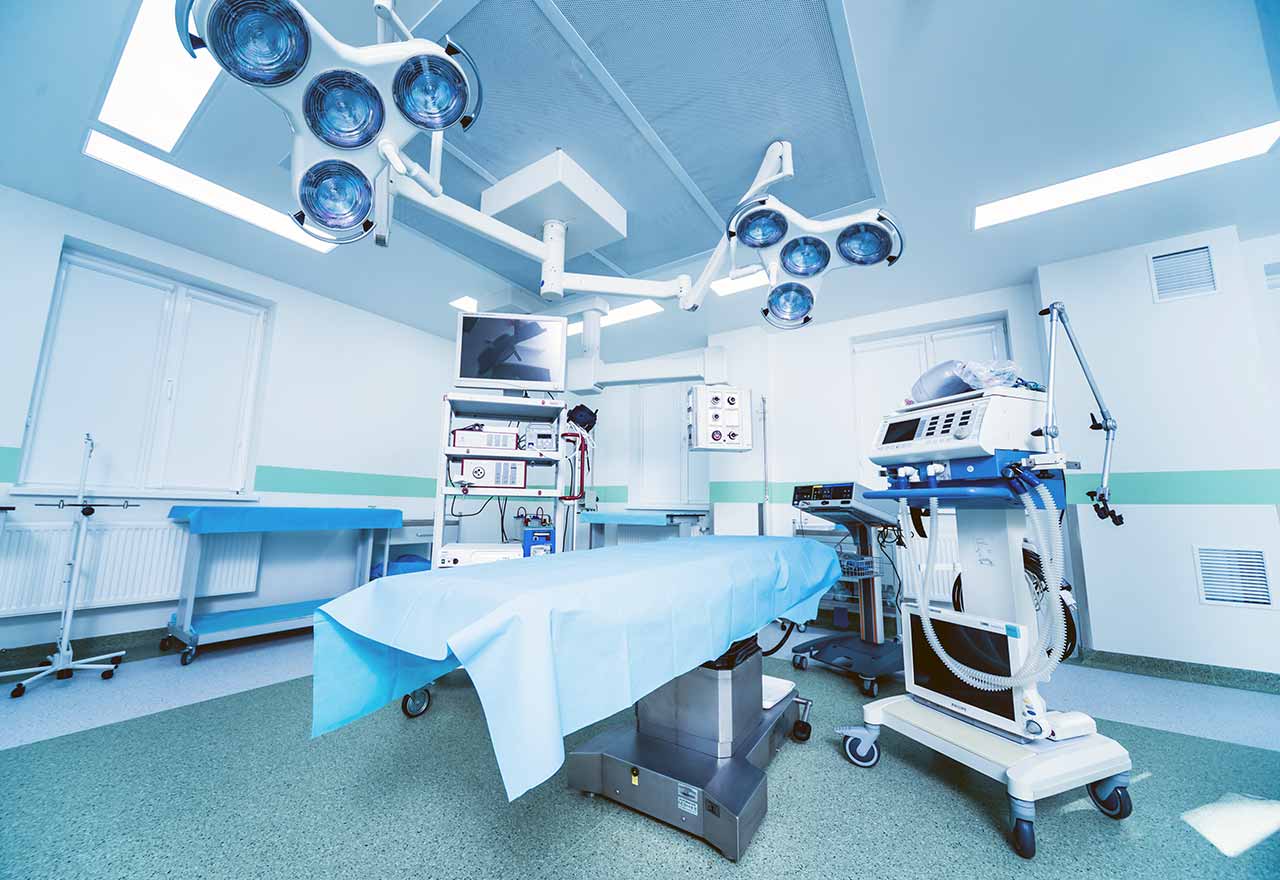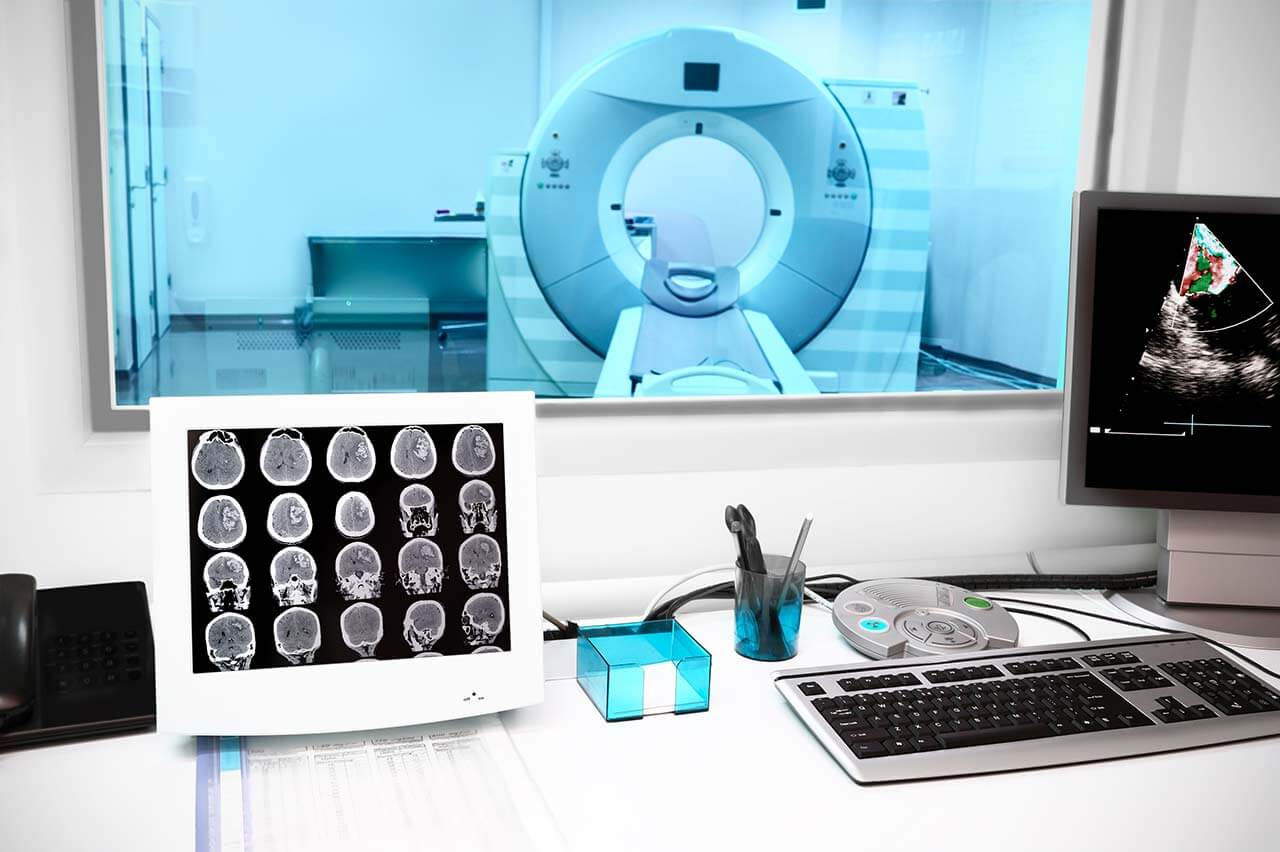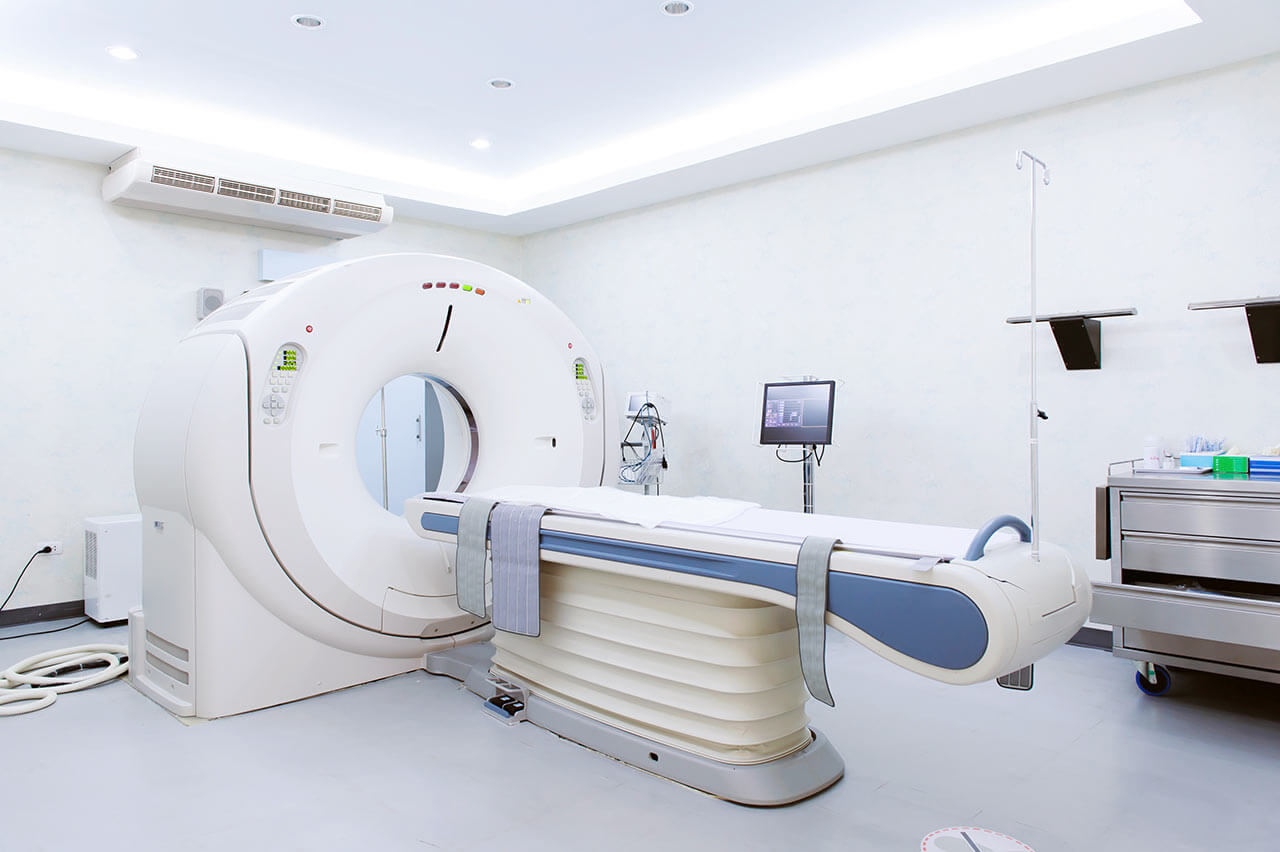
The program includes:
- Initial presentation in the clinic
- clinical history taking
- physical examination
- laboratory tests:
- complete blood count
- general urine analysis
- biochemical analysis of blood
- TSH-basal, fT3, fT4
- tumor markers
- indicators of blood coagulation
- CT scan / MRI of the abdomen
- abdominal ultrasound scan
- 1 course of chemotherapy
- nursing services
- services of leading experts
- explanation of individual treatment plan
How program is carried out
During the first visit, the doctor will conduct a clinical examination and go through the results of previous laboratory tests and instrumental examinations. After that, you will undergo an additional examination, including laboratory assessment of liver and kidney function, ultrasound scan. Based on the received results, the doctor will elaborate the chemotherapy regimen. If necessary, related medical specialists will be involved in the elaboration of a treatment regimen (tumor board).
Chemotherapy is carried out as the day hospital procedure, without mandatory admission to the hospital. After the placement of a venous catheter, you will stay in a comfortable ward. An infusion system will be connected to the catheter, through which the required drug or a drug combination will be administered. All drugs are administered by intravenous drip, slowly, so the total duration of the infusion can be up to several hours. All this time, doctors and nurses will monitor your health condition closely.
After the course of chemotherapy, you will stay under medical supervision in the ward for a few more hours. If your general condition is good, your doctor will allow you to leave the hospital. You will receive the medical report with detailed recommendations regarding further treatment. In the future, you will be able to have a distant consultation with your attending physician and schedule the next course of chemotherapy, if necessary.
Required documents
- Medical records
- MRI/CT scan (not older than 3 months)
- Biopsy results (if available)
Service
You may also book:
 BookingHealth Price from:
BookingHealth Price from:
About the department
According to the Focus magazine, the Department of Hematology, Oncology and Pulmonology at the University Hospital Hamburg-Eppendorf is one of the best medical facilities in Germany for the treatment of colorectal cancer!
The department provides comprehensive diagnosis and highly effective treatment of solid tumors, benign and malignant blood diseases, and pathologies of the lungs and other respiratory organs. The department's specialists have unique expertise in the treatment of leukemia, lymphomas, germ cell tumors, gastrointestinal malignancies, lung cancer, bone and soft tissue sarcomas, and head and neck tumors. The pulmonary team focuses on patients with cystic fibrosis, interstitial lung disease, and pulmonary hypertension. The specialists have well-equipped endoscopic rooms for diagnosis and treatment. The department's medical team works closely with surgeons, radiologists, radiation therapists, urologists, gynecologists, otolaryngologists, and physicians of other specialties. The healthcare facility holds weekly interdisciplinary tumor boards, where clinical cases are discussed individually and optimal treatment regimens are developed for each patient. The department is certified in accordance with the standards of the German Cancer Society (DKG) and the European Society for Medical Oncology (ESMO). More than 2,800 inpatients are treated here each year, and nearly 7,000 more patients are cared for on an outpatient basis. The department is headed by Prof. Dr. med. Carsten Bokemeyer.
Patients with solid malignant tumors, leukemia, and lymphomas have access to a full range of modern treatment methods with proven effectiveness: chemotherapy, targeted therapy, antibody therapy, and immunotherapy. Patients with complex cases of hematopoietic cancers are offered a bone marrow transplant procedure, which is performed in a specially equipped unit under absolutely sterile conditions. The most popular treatment method is chemotherapy. The department performs more than 15,000 courses of chemotherapy treatment annually, most of them on an outpatient basis. The therapeutic offer of the medical facility is completed by palliative care for patients with terminal stages of oncology. This treatment is not curative, but aims to alleviate symptoms and improve the quality of life of cancer patients. Great importance is also attached to the psychological support of patients undergoing treatment in the department.
The department's team of hematologists also specializes in the treatment of benign diseases of the hematopoietic system. The doctors focus on patients with hemophilia, a rare hereditary blood clotting disorder that causes spontaneous and uncontrolled bleeding. Patients with hemophilia are treated in a highly specialized center certified to European standards and considered one of the best medical facilities of its kind in Germany. Treatment is based on replacement therapy with clotting factor concentrates. The treatment regimen is prescribed on an individual basis after a comprehensive diagnostic examination.
The department has a highly professional team of pulmonologists specializing in the treatment of lung and respiratory tract diseases. Doctors of this profile have extensive experience in the treatment of pulmonary hypertension, interstitial lung disease, pulmonary sarcoidosis, cystic fibrosis, severe obstructive pulmonary disease, lung cancer, and rare lung diseases. During the therapeutic process, specialists use complex drug treatment regimens, inhalation therapy, breathing exercises, oxygen therapy, and other methods. The department has a bronchoscopy unit, which offers a full range of endoscopic examinations for visual assessment of the upper and lower respiratory tract, as well as interventional therapeutic manipulations. Bronchoscopy is performed under local anesthesia (sometimes with sedation), which eliminates pain and discomfort during the procedure. On a daily basis, the pulmonologists in the department perform diagnostic bronchoscopy, bronchoalveolar lavage, dilation and stenting for airway stenosis, hemostasis for internal bleeding, removal of foreign bodies from the airways, bronchoscopic lung volume reduction, and other endoscopic procedures.
The department's main areas of clinical practice are as follows:
- Oncology
- Diagnostics and treatment of solid malignant tumors
- Diagnostics and treatment of colon cancer
- Diagnostics and treatment of stomach cancer
- Diagnostics and treatment of esophageal cancer
- Diagnostics and treatment of pancreatic cancer
- Diagnostics and treatment of germ cell tumors
- Diagnostics and treatment of lung cancer
- Diagnostics and treatment of bone and soft tissue sarcomas
- Diagnostics and treatment of head and neck malignancies
- Diagnostics and treatment of malignant blood diseases
- Diagnostics and treatment of leukemia
- Diagnostics and treatment of lymphomas
- Diagnostics and treatment of solid malignant tumors
- Hematology
- Diagnostics and treatment of benign blood diseases
- Diagnostics and treatment of hemophilia A and B
- Diagnostics and treatment of von Willebrand disease
- Diagnostics and treatment of rare blood diseases caused by deficiency of blood coagulation factors I, II, V, VII, X, XI, and XIII
- Diagnostics and treatment of thrombocytopathy
- Diagnostics and treatment of benign blood diseases
- Pulmonology
- Diagnostics and treatment of benign diseases of the respiratory system
- Diagnostics and treatment of pulmonary hypertension
- Diagnostics and treatment of interstitial lung disease
- Diagnostics and treatment of pulmonary sarcoidosis
- Diagnostics and treatment of cystic fibrosis
- Diagnostics and treatment of severe obstructive pulmonary disease
- Diagnostics and treatment of rare lung diseases
- Diagnostics and treatment of malignant diseases of the respiratory system
- Diagnostics and treatment of lung cancer
- Diagnostics and treatment of chest wall malignant tumors
- Diagnostics and treatment of benign diseases of the respiratory system
- Diagnostics and treatment of other diseases
The range of therapeutic services provided by the department includes the following:
- Conservative treatment of malignant diseases
- Chemotherapy
- Targeted therapy
- Antibody therapy
- Immunotherapy
- Bone marrow transplantation for the treatment of blood cancer
- Replacement therapy with coagulation factor concentrates for the treatment of hemophilia
- Conservative treatment of pulmonary diseases
- Drug therapy
- Inhalation therapy
- Breathing exercises
- Oxygen therapy
- Interventional treatment of pulmonary diseases
- Bronchoalveolar lavage
- Bronchoscopic dilation and stenting to eliminate airway stenosis
- Bronchoscopic hemostasis to stop internal bleeding
- Bronchoscopic removal of foreign bodies from the airways
- Bronchoscopic lung volume reduction
- Other treatment methods
Curriculum vitae
Higher Education
- 1989 Doctorate, Hannover Medical School, Hannover, Germany.
- 1989 Foreign Medical Graduate Examination in the Medical Sciences (FMGEMS).
- 1989 - 1995 Internship, Department of Internal Medicine, Hannover Medical School, Hannover, Germany.
- 1995 - 2004 Faculty Member, Department of Internal Medicine, Section of Hematology, Oncology, Immunology and Rheumatology, University Hospital Tuebingen, Germany.
Academic Positions and Achievements
- 1999 Habilitation and Venia legendi, Department of Internal Medicine, Hannover Medical School, Hannover, Germany.
- 2000 Nomination as C3 Professor for Internal Medicine, University of Muenster, Germany.
- 2000 Associate Professor for Internal Medicine, University of Tuebingen.
- 2004 Professor of Internal Medicine, University of Hamburg.
Board Certification
- 1993 Board certification in Oncology, European Society for Medical Oncology.
- 1995 Board certification in Internal Medicine, German Board of Internal Medicine.
- 1997 Board certification in Hematology, German Board of Internal Medicine.
- 2000 Board certification, Quality Management in Medicine.
Prizes, Awards, and Honors
- Fellowship of the German Academic Scholarship Fund.
- Award of the Ministry of Science for Outstanding Student Achievements in Medicine.
- 2000 National Award from the German Cancer Society.
- 2000 Award for Experimental Urological Research, German Society of Urology.
- 2001 Award from the Cancer Society of Baden Wuerttemberg.
- 2001 Award from the German Society for Clinical Pharmacology.
- 2002 Scientific Award for Medical Oncology.
- 2006 Anita and Cuno Wieland Prize from the University of Heidelberg.
- 2014 Award from the European Society for Medical Oncology (ESMO).
- 2018 Wilhelm Warner Award for Outstanding Achievement in Cancer Research.
Activities in Committees
- 1997 - 2004 Member of the Research Advisory Committee of the University of Tuebingen.
- 2000 - 2004 Founding Member of the Comprehensive Cancer Center at the University of Tuebingen.
- 2001 - 2004 Founding Member of the Interdisciplinary Center for Soft Tissue Sarcoma at the University of Tuebingen.
- Since 2002 Chairman of the Oncology Examination Committee of the European Society for Medical Oncology (ESMO).
- Since 2002 Board Member of the German Society for Hematology and Medical Oncology (DGHO).
- Since 2005 Board Member of the German Cancer Society (DKG).
- Since 2005 Board Member of the Hamburg Cancer Society.
- Since 2011 Vice President of the Hamburg Cancer Society.
- Since 2014 President of the Northwest German Society of Internal Medicine.
- 2016 - 2017 President of the German Society for Hematology and Medical Oncology (DGHO).
- 2018 - 2019 Vice President of the German Society for Hematology and Medical Oncology (DGHO).
Memberships in Professional Societies
- Since 1991 German Cancer Society (DKG).
- Since 1991 European Society for Medical Oncology (ESMO).
- Since 1995 American Society of Clinical Oncology (ASCO).
- Since 1995 German Society for Hematology and Medical Oncology (DGHO).
- Since 1998 German Association for Bone Marrow Transplantation (DAGKBT).
Photo of the doctor: (c) Universitätsklinikum Hamburg-Eppendorf (UKE)
About hospital
According to the Focus magazine, the University Hospital Hamburg-Eppendorf is one of the top ten hospitals in Germany!
Since its foundation in 1889, the hospital has taken a leading position in the European medical arena, which it still holds today. A highly competent medical team of more than 15,300 employees takes care of the health of patients. Approximately 2,900 of them are physicians and researchers, and more than 3,400 work as nurses and therapists. The hospital has 1,738 beds for inpatient treatment, and many diagnostic and therapeutic services are provided on an outpatient basis. A solid foundation for successful clinical practice in the medical complex is formed by a combination of research achievements with state-of-the-art equipment and the highest professionalism of doctors. In addition, the hospital has a modern and extremely comfortable infrastructure. The most important value for every employee of the University Hospital Hamburg-Eppendorf is the health and well-being of every patient.
The medical facility was the first university hospital in Europe to implement an electronic system for storing patient medical reports. As a result, all diagnostic and treatment protocols are stored electronically. In 2011, the hospital was certified as the first fully digital hospital in Europe.
The hospital represents all areas of modern medicine. The doctors of the healthcare facility have a wealth of theoretical knowledge and vast clinical experience, which allows them to easily cope with the treatment of both common and extremely rare, complex clinical cases. About 550,000 patients are treated here each year, over 450,000 of whom receive outpatient medical care.
An important part of the work of the University Hospital Hamburg-Eppendorf is research activities aimed at developing innovative diagnostic and treatment methods. The main areas of research of the hospital include neurobiology, oncology, cardiovascular research, and research on infectious and inflammatory diseases. Special attention is also given to research in molecular imaging and skeletal biology.
The hospital is distinguished by its first-class level of medical care, which is confirmed by numerous quality certificates of European and international standards: DIN EN IS0 9001 certificate, certificates of the German Cancer Society (DKG) in the treatment of breast cancer, colon cancer, gynecological cancer, prostate cancer, and other oncological diseases, certificate of the German Cardiac Society (DGK) in the treatment of acute coronary syndrome, certificate of the German Spine Society (DWG), and others.
Photo: (с) depositphotos
Accommodation in hospital
Patients rooms
The patients of the University Hospital Hamburg-Eppendorf stay in comfortable single and double bright rooms with a modern design. Each patient room has an ensuite bathroom with a shower and a toilet. The standard patient room furnishings include an automatically adjustable bed with an orthopedic mattress, a bedside table, a wardrobe, a table and chairs for receiving visitors, a telephone, a radio, and a TV. Wi-Fi access is available in patient rooms and throughout the hospital.
If desired, patients can stay in single enhanced-comfort rooms. These rooms are more spacious and are equipped with upholstered furniture, a safe, and a mini-fridge.
Meals and Menus
The hospital offers three meals a day: breakfast, lunch, and dinner. Breakfast and dinner are served in the form of buffets, and for lunch you can choose from several set menus – in total, more than 20 dishes are served for lunch, including vegetarian ones.
If, for some reason, you cannot eat all of the foods, you will be offered an individual menu. Please inform the medical staff about your dietary preferences prior to the treatment.
Further details
Standard rooms include:
![]() Toilet
Toilet
![]() Shower
Shower
![]() Wi-Fi
Wi-Fi
![]() TV
TV
Religion
Religious services are available upon request.
Accompanying person
During the inpatient program, an accompanying person may stay with you in a patient room or hotel of your choice.
Hospital accommodation
During the outpatient program, you may stay in a hotel at the hospital.
Hotel
During the outpatient program, you may stay in a hotel of your choice. Managers will help you choose the most suitable options.
The hospital offers a full range of laboratory tests (general, hormonal, tests for infections, antibodies, tumor markers, etc.), genetic tests, various modifications of ultrasound scans, CT scans, MRI and PET / CT, angiography, myelography, biopsy and other examinations. Treatment with medications, endoscopic and robotic operations, stereotaxic interventions is carried out here, modern types of radiation therapy are also used. The hospital offers patients all the necessary therapeutic techniques.
- Coiling and clipping of aneurysms of different localizations
- Transjugular intrahepatic portosystemic shunting in patients with portal hypertension
- Minimally invasive surgeries (da Vinci)
- Removal and reconstruction of mammary glands
- Hyperthermic intraperitoneal chemotherapy (HIPEC)
These are arteriovenous malformations and angiomas, vascular aneurysms, pathologies of the mammary glands, pelvic organ prolapse, urinary incontinence, malignant tumors of various localizations (area of special attention is treatment of intestinal cancer), pathologies of liver and pancreas, cataracts and rare ophthalmic pathologies (aphakia, aniridia ), infertility and other diseases.
- Interventional neuroradiology
- Mammology
- Oncology
- Gastroenterology
- Surgery
Over 2,900 highly qualified physicians and researchers work at the hospital.





